Taste Testing Robots Judge Authenticity of Chinese Food
The food industry in China is heavily regulated. Along with being safe, the government wants to ensure the authenticity and quality of the foods companies put out. Officials have recently turned to AI to make sure products are up to standard.
A government-funded program is using taste testing robots powered by artificial intelligence to help verify the quality and authenticity of some mass produced Chinese food. The program, which has been going on for three years, includes 10 Chinese food manufacturers. Some of the food being sampled by robots includes dried noodles, rice vinegar, tea, and yellow wine.
Sensors Simulate Eyes, Nose and Tongue
The robots are equipped with electrical and optical sensors which simulate eyes, noses, and tongues. The sensors collect visual and aroma information from the food and ingredients. A neural network algorithm processes all that information and looks for patterns in the data.
The robot, which can learn on the job, monitors everything along the production line from raw materials to the final product. It makes sure all food has the same smell, taste, and color. The algorithm was trained on information from a panel of food experts.

Taste Testing Robots Have Raised Quality and Profits
The report says that the taste testing robots have helped increase productivity and quality along with reducing costs. It claims that AI helped boost manufacturers’ profits by more than $44.5 million since 2015.
Previously, testing the food was up to human tasters. The process was slow and results could vary depending on the person. The robots have about the same accuracy as human testers but can finish each tasting in less than a second and run 24 hours a day.
Should Food Authenticity Be Judge By AI?
Some feel that food authenticity should not be judged by robots. Five chefs can cook the same dish five different ways. Many feel AI would have issues figuring out which ones are authentic.
“Chinese food is extremely sophisticated. It is probably the most difficult to standardize in the world. It is hard to judge which is the most authentic. I don’t think AI can tell the difference within the next two or three decades,” said Sun Lin, director of international affairs at the China Cuisine Association, the biggest society of chefs in China.
Check out our articles on robots milking cows over 5g and grocery smart shelves running targeted ads based on age and sex.

